The maverick writer is an enigma of a form. With lyrical precision, he dissects the Nigerian affairs with biting metaphors. He stages satires that shocks the oppressing gang of elite. His prose pokes into the eyes of maladministration. Odia Ofiemu isn’t your regular man on the streets. Here is a bard brewing popular poetry. At 70, you can guess an interview with him would bring forth strong views, regrets and pains. It did with NPO Reports’ DANIEL FAYEMI caught up with him in Lagos ahead of events marking the milestone. Excerpts:
How does it feel to be a Nigerian as you turn 70?
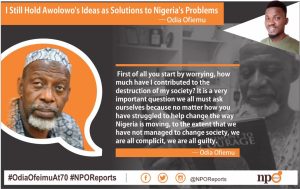
I have lived a life of searching for answers. All my life, I always believed there was a way of finding an answer to Nigeria’s problems. You could say that everything I have written since my birth is about how to make my country better than the way it has always been. But things did not always happen as one expected.
The tone of national life was rising and moving towards take off. We were almost at take-off stage in the mid 50s when things started crumbling and the kind of crumbling that took place was heightened when you made so much money from oil but the rest of the world outsmarted us, and made us waste the money. Borrowing money that we had no reason borrowing so that we got to the point where whatever planning you did entered a sinkhole which frustrated development.
Since then, I mean when they started to take jumbo loans after Murtala Mohammed came to power, we have not managed to get out of the rot.
When I talked about entering that sinkhole, it was not just about money. It was about a way of managing society. The modes of management before were abandoned, the country no longer planned and when you fail to plan, you have planned to fail. The Nigerian state began to play the capitalist game. We were neither capitalists nor socialists. We were just a poor country that needed to put in place an educational core, a skilled manpower that could do many of the things that we were hitherto unable to do.
Somehow we never got out of that rot because the international system imposed a format upon our leadership which they have not yet found an alternative to.
Looking back now, what would you say is your biggest regret?
In relation to the national picture I’ve tried to paint, my greatest regret is that the military regimes that came destroyed the basis for the self-mobilization of various Nigerian groups whether they were in the trade unions or ethnic unions or they were in the bureaucracy. It was the smashing of the Nigerian bureaucracy that laid the basis for much of the planlessness that overtook Nigeria because those who did not want to plan, did not need an engine for planning. Bureaucracy was a good engine for planning so that was a serious problem.
In the end, you could say that we built Nigeria in the image of an envious generation that we might call the militariats. We used to fear that government would be taken over by the proletariat, the working class but the militariats took over the society and reduced society to a planless amalgam of unmobilizable people.
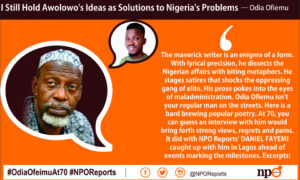
They no longer wanted people to be able to come together for anything. The military created that kind of environment that made it impossible to look at the future and say this is what the future would be like. Today, young people who wish to survive in the professions are no longer as confident as we used to be when we were much younger. Before I left the University I already knew where I was going to work. If you have a well organized society even today, in the sense that the Nigerian bureaucracy would know how many children are leaving school, how many have jobs, how many jobs there are for people to do. Without such information you can’t plan a society and that is exactly what they removed from the Nigerian societies, the knowledge that makes it possible to plan.
When we talk about development these days, you actually wonder what Nigerians call development. Where a government can actually talk about distributing money to people as a form of empowerment. It is not just robbery, they are depersonalizing and pouring indignity upon fellow Nigerians because they know that those monies they are giving to them won’t carry them anywhere.
To find yourself living in such a society without an organised group that can respond to it except ethnic organisations merely abusing other ethnic groups. That is the kind of society that the military have created. The society in which the working class cannot speak for the working class; society where when the labour goes on strike, they go on strike because of the leadership of the unions rather than for the workers.
We’ve all continued talking about a welfare package for the masses. There can’t be a welfare package for the masses when there is no overall planning of the economy. Go from state to state today, the argument is still about minimum wage. A society that can discuss minimum wage in a meaningful sense must be one that knows how much it’s actually producing. We don’t know how much we are producing in Nigeria. The oil industry which is a very modern industry and therefore ought to be backed by full statistics do not have it and if they have it, the federal government has not shown that it knows how to use the figures.
Therefore, a man of 70 years old, who remembers how the journey began, how we had societies that were very bullish and ambitiously looking towards development, first of all you start by worrying, how much have I contributed to the destruction of my society? It is a very important question we have to ask ourselves because no matter how you have struggled to help change how Nigeria is moving to the extent that we have not managed to change society, we are all complicit, we are all guilty. It is not enough to say I am not one of the looters. Today, it is the case that almost everything you do in Nigeria is based on looting because if you are talking about a good business in Nigeria and you scratch it to the bottom, you will discover that much of that business came from taking advantage of the government. As long as our society is like that, people who are genuinely creative would never be able to achieve their goals and when these creative cannot achieve their goals, the society is left in limbo.
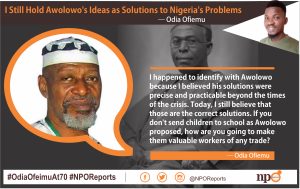
How come you still have faith in the possibility of Nigeria getting out of this mess?
The reason is that the kind of problems that have been created for Nigeria are building up to a crisis. And it is a crisis that those in power do not have a clue as to how to solve. If you refuse to put children in school and you have about 15 million who are not going to school and you have about 10 million who left long before them and are themselves doing next to nothing, you will know that a big crisis have been created for that society. What makes it worse is that guns have become easy to get. Those children you did not send to school, nobody needs to teach them they can learn how to shoot. Many of them are learning to be kidnappers, bandits and very uneducable roughians who could be great citizens if there was a government to mobilize them. To find yourself at 70 having to deal with such problems is like asking when I was younger, what would I have done.
When we were much younger, we dreamt of a society well mobilized. The labour movement was so good, we imagined a future where Nigeria would be industrialized; those days Bola Ige was bragging about how Nigeria would be the first African super power. We envisaged a society where enhanced productivity would be made possible by people who have been trained to produce.
Almost all the industries that were established between 1960 and 85 are in limbo. Majority of them crashed out and while they were crashing out, many economists trained by the World Bank told us that that is the way the world works; that those that are not efficient will die out. The truth is that many of the inefficient industries in the world survived. Not because they acquired more efficiency but because the economic policies of their countries defended their capacity to produce. They don’t have to produce at a cheaper rate than other countries.
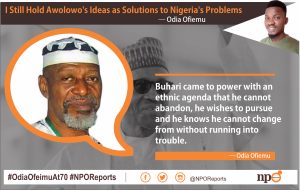
Those of us who used to quarrel with import substitution industries, we now know, that they are not as bad as we thought. When people are producing for themselves, even when they do so without profit, but they manage to keep things going. It follows that they are not importing debts or crisis into their country. They are just trying to balance their accounts without having to owe foreign countries.
Is that not what the Buhari administration is trying to do by shutting the borders to encourage local production?
I like that question because it assumes it, that those who are locking the borders have a plan to make the situation different. Why can’t we start seeing the impact before we start closing borders? Before closing borders you must have the means to produce first. Across Nigeria, most of industries that used to produce are dead and the efforts to put some of them back one stream is not serious minded because a country that has an electricity deficit like the one we have in Nigeria cannot pretend to be industrializing. If they pretend that they are industrializing, they are lying to all of us.
You know that if you set up that factory, one of the biggest challenges you’re going to face is electricity. There are many areas you’d expect the federal government to have done 1234 before locking the borders. So, we earn the enmity of our neighbors without even setting in place the means to beat them. It is like the way northern Nigeria behaved. They did not educate their children but they found ways of destroying the advantages that other parts of Nigeria had but they did not improve their own.
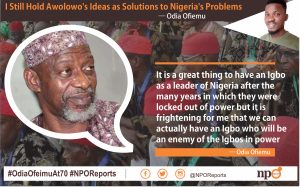
So if you accuse many Northerners of going to school merely to fight Southerners, the question remains that how can we train them to train their people to develop themselves. Forget fighting Southerners for now but develop your people let them have good lives. But because those children have not gone to school and they are not producing enough, and they have now found guns that they can use in fighting those who refused to send them to school, the rest of us are in trouble, so much so, that, Agriculture may soon die in the South.
If people are not going to the farms, famine would take over. All these talk about agro industry development will go under.
People accuse activists these days of selective activism, even you stand accused of failing to speak out during the Yar’Adua health scandal in your capacity as president of ANA…
You know what you should tell the person who said that? Tell them I was the Chairman of the guerilla press. The News, Tempo, AM News, PM News. And if they think that those papers did not fight, I am publishing all of them in a book I call Tribal dilemma’ and ‘Ambush of the 4th republic’ they are two books. So that if he wants to know what I did or said, he won’t have long to wait. The truth again is that I don’t need to have been speaking about any particular issue in my role as a man attempting to change society to be regarded as a valued one because there isn’t only one way to change a society. If I wrote about how to change the society and he refused to read it, because that’s obviously what this shows, how would he ever know how other Nigerians think about how to change the society.
There is even the other case of young me who joined the Association of Nigerian Authors (ANA) who accused me because they don’t know that many of the policies that they think they are proposing were the ones that others fought against. That is to say I provided guidelines and policy positions that others were fighting against and which they themselves were fighting against without realising they are fighting against their own future.
It’s a very painful thing to see, young people who have no knowledge taking very strong positions against public policy without realising that they were fighting against their future, it’s painful. As a young man I can tell you that one of the things I take pride in, is that I knew my society well enough that I could write knowledgeably about what was happening.
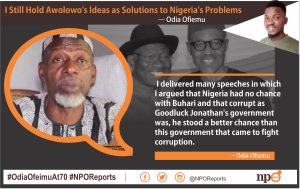
Obviously you can’t take on every battle in the society. How do you choose which issues to take on and which ones to ignore?
No, I don’t have to work too hard. I grew up at a time when all the radical movements in the country were proposing ways to improve the society. I happened in the end to identify with Awolowo’s position because I believed his solutions were precise, practicable and the kind of policies I could identify with beyond the times of that very crisis. Today, I still believe that those are the correct solutions. If you don’t send children to school as Awolowo proposed, how are you going to make them valuable workers of any trade? If you do not give good health service to the people, all the medical doctors you’re producing, how do they practice their profession? All the things they ask for, like this agro allied industries, building cottage industries as our people used to do, all the textile industries, more than 400 have closed down.
To have waited for all these industries to close down, makes anybody’s role as an activist almost trite because we could not stop the industries from closing down. We are not able to build new ones. We see people who have reached pension age not getting their pensions. It’s good to talk about being an activist, but if being an activist means that we have not been able to organise a political movement that can stop bad governance then you can say we haven’t succeeded. But that doesn’t mean that we cannot succeed. It is also true that as events are coming together, is also forcing us to look at new ways that we can stop bad governance.
When you look at the failure of existing governments, their failures are helping actually, to mobilize people in a way that seemed impossible before. Muhammadu Buhari was brought together by a very mindless lot of supporters who did not care whether he had the capacity or not to do good things. I don’t like the word mindless that I have used but that is precisely the proper word to use because they refused to allow things of the mind to govern how they felt about Buhari’s government. Today, none of the positions that the Buhari’s government is taking is an improvement on the previous one’s. I don’t know any that is.
But Nigerians were tired of the previous administration. What do people do when there are not much options?
At that time, the search for options was reduced by the elite struggling for power. Buhari was not the only option available but he was picked because it was generally believed that he was the representative of a Northern power force and that that power force would override any other. It was not because he had a good policy that anyone could point out properly. A man who says ‘I’m going to wipe out unemployment’ that’s not a program. If you say you’re going to make the NNPC to work properly, that’s not a program. Because he did not have a programatic approach to policy making and policy implementation, very many people who studied government knew that he had no chance of making good if he came to government. I delivered many speeches in which I argued that Nigeria had no chance with Buhari and that corrupt as Goodluck Jonathan’s government was, he stood a better chance than this government that claimed it would fight corruption. I always remembered that Buhari was the Head of State that jailed many Nigerians for making money for their political parties but from that time till today, President Muhammadu Buhari has not told us how to finance political parties in a way that would not require stealing government money. So how has he been running his political parties, same way, stealing government money. And if they say it is not stealing, let them prove to us where the people that are funding them got the money from.
Remember Goodluck said that stealing is not corruption and everybody went after him but the truth is that stealing is not corruption, stealing is a crime. Corruption in Nigeria is not a crime. Corruption is something that people need to negotiate before arriving at what it is. Therefore if you’re comparing the two, you’re comparing different things. When you call stealing corruption you’re actually reducing the level of the criminality. When you call it corruption it means it’s something that people can overlook. People are overlooking so much stealing by calling it corruption.
What we do need in Nigeria is a formality that does not allow wooliness in the definition of crime. I believe that left alone, the Nigerian Police, just left alone without the intervention of politicians can fight corruption more that it’s fought today. That doesn’t mean that the Police will not be corrupt. It means that if they are left on their own without the intervention of politicians, they would do a better job.
What about the roles of the EFCC and ICPC?
Those ones are actually a worsening of the security situation because the command that pre-existed them did a better job. If an auditor general wrote a report that showed how government people are stealing money, the Policemen are supposed to be called in to do their job. These days you can’t do that. They will sack the auditor general for doing the right thing. This is why after they have padded the budget, they merely need to wait at the end of the day for the auditor general to paper it over.
We can afford a different kind of country and I think that for that different kind of country, we have materials that can make it possible.
One of the reasons why all the patterns of government that could make things better are not happening is because Buhari came to power with an ethnic agenda that he cannot abandon, he wishes to pursue and he knows he cannot change from without running into trouble. There is no way that a man governing a multi ethnic state can do well if he believes that it is only his ethnic nationality that can do good. It means that merit will not be allowed and if merit is not allowed at certain levels of government it also means that productivity will fall, creativity will not be even in existence. We are therefore living in a country where the man who many people thought would make all the difference is worsening the case.
What are your thoughts on the clamour for an Igbo president?
I tell you my attitude towards it. I want a president who has a position on Nigeria. Not a president who has a position on the Igbo question or the Yoruba question. Buhari has a position on the Fulani question. That’s why we are in the mess we are in. If they give us an Igbo president who is like Buhari, we are going to be in another mess like that. There are a few Igbo politicians who are emerging as cross ethnic leaders in the sense that they are able to provide answers which you cannot tie immediately to their being just Igbo. I am not sure they would be very popular in Igbo land but if one of them survives, the next question we should ask is on what basis are they going to govern. Nigerian politicians are afraid to state what their positions are. Not everybody is an Awolowo who would tell you years in advance, this is what I want to do and this is how I want to do it. But because many Nigerian politicians do not have the courage to come out we generally have a problem when somebody says it is the turn of the Igbo.
It is a great thing to have an Igbo as a leader of Nigeria after the many years in which they were locked out of power but it is frightening for me that we can actually have an Igbo who will be an enemy of the Igbo people. I’ll give you an example, I have a collection of articles I wrote for the guerilla media during the Abacha era. One of the last pieces I wrote towards the beginning of the fourth republic was Igbo against the Igbo. You know that if the Igbo people had properly mobilized themselves, most of those roads in Igboland that are appearing to be unrepairable would have been repaired by now.
The average Igbo politician has not managed to see that ethnicity is not a curse and there is no reason why people should be afraid of what other people think of them because of their ethnicity. See the way Yorubas have just formed Amotekun, if they had an industrial program which is also well designed to produce results, the federal government won’t be able to stop it.
The Igbos built machine tool industries after the civil war and a few of them survived but you can tell that if they mobilized a lot more in the manner in which Amotekun is discussing security if you’re discussing industrial policy in that way the federal government will be left with no choice but to allow it to happen.
We need an Igbo leader but supposed we get one who, in the way it is happening in the north, can leave millions of children on the street hopeless while making big mouth in Abuja that he is the leader of Nigeria, it’s a big no. For me, until I know who that Igbo leader is before I support because we know Igbo leaders who are right headed and we know a lot of them too who are very wrong headed. I’m not going to choose an Igbo man simply because he’s Igbo. You chose a Fulani for being a Fulani and you have a terrorist group claiming they own your homeland. I’m not sure I want to vote for that kind of candidate, no.
What are your thoughts on the removal of HH Mumammadu Sanusi II from the throne. Do you agree with the popular view that it’s an affront on the traditional institutions?
Let me be very honest with you. The governor of the state has powers to wield there and if the law is not properly observed in the removal of the man, I believe that the man would go to court. But I am not interested in the legalities, it doesn’t interest me at all. But I ask a question, that child in Kano, who is not going to school today, and whom Sanusi says we must send to school, what fate lies ahead for them? It is a question that cannot be answered by arguing about Sanusi or Bayero and I think that where we are not able to answer that question, it doesn’t matter who you make an emir. Whereas, if you send those children to school, it can create a basis for defending the Kano economy. The defense of the children through education is the only way you can defend the economy of the city and the state in the future.
Sanusi tried to think of a Nigeria that is different, a Nigeria where education matters but a traditional ruler in the North frankly can’t fight that battle well because the very structure of traditional rulership in the North is supportive of schemes that do not favour the orientations that Sanusi wishes for us to have. I remember when I was going for the youth corps, I was told that if you had a red car in that town it would be stoned because the emir has a red car. That means you’re trying to put yourself in the position of the Emir.
You mentioned earlier that you are publishing two new books soon. Can you give us some insights on what they are about?
All I can tell you is that all the fourteen collections that I have written so far, are now in three jumbo collections. One has six collections, one has five and one has three. If you go beyond the poetry, I have books on the media, and books on politics. I do seriously believe that all the problems that Nigeria faces as a country have solutions and I think these books I’m contributing are an attempt to show that solutions are available. If we do not allow ourselves to follow those solutions, it is not because we don’t know what the answers are because they are very available.


